|
|
|
Sort Order |
|
|
|
Items / Page
|
|
|
|
|
|
|
| Srl | Item |
| 1 |
ID:
024643
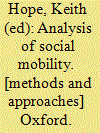

|
|
|
|
|
| Publication |
Oxford, Clarendon Press, 1972.
|
| Description |
iv, 254p.
|
| Series |
Oxford studies in social mobility. working papers; no.1
|
|
|
|
|
|
|
|
|
|
|
|
Copies: C:1/I:0,R:0,Q:0
Circulation
| Accession# | Call# | Current Location | Status | Policy | Location |
| 010518 | 305.513/HOP 010518 | Main | On Shelf | General | |
|
|
|
|
| 2 |
ID:
139550
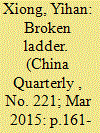

|
|
|
|
|
| Summary/Abstract |
This paper attempts to explain why education fails to facilitate upward mobility for migrant children in China. By comparing a public school and a private migrant school in Shanghai, two mechanisms are found to underpin the reproduction of the class system: the ceiling effect, which is at work in public schools, and the counter-school culture, which prevails in private migrant schools. Both mechanisms might be understood as adaptations to the external circumstances of – and institutional discrimination against – migrants rather than as resistance to the prevailing institutional systems. Thus, the functioning of these mechanisms further strengthens the inequality embodied in the system.
|
|
|
|
|
|
|
|
|
|
|
|
|
|
|
|
| 3 |
ID:
193288
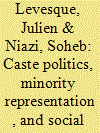

|
|
|
|
|
| Summary/Abstract |
Social stratification among Muslims in South Asia, specifically the phenomenon of Muslim caste, has recently gained scholarly and media attention, particularly in India. However, the public discussion – often empirically shallow and politically polarized – fails to adequately explain the mechanisms through which Muslims perpetuate social inequality while invoking egalitarian principles. This special section, based on a panel held at the 2022 BASAS annual conference, aims to contribute to the scholarly and public discourse by advocating for the study of Muslim caste associations. Taking the associational life of caste into account provides a tangible object of study. Moreover, it shifts the focus away from macro-level discussions towards an empirically grounded analysis at the meso- and micro-levels. This introduction explores two central aspects. First, we suggest that caste associations offer a fresh perspective on the study of Muslim social mobility, beyond the oft-assumed imitation of dominant caste groups or Ashrafization. Second, documenting caste associations helps us understand the diversity of Muslim representation, specifically, the tension between Muslim minority politics and Muslim caste politics. Overall, this special section provides multiple examples of Muslims’ associational engagements with caste, which encompass endeavours as diverse as political assertion, declassing, social exclusion, or universal charitable aspirations.
|
|
|
|
|
|
|
|
|
|
|
|
|
|
|
|
| 4 |
ID:
113205
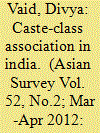

|
|
|
|
|
| Publication |
2012.
|
| Summary/Abstract |
This paper empirically analyzes the association between caste and class in India. I find a tentative congruence between castes and classes at the extremes of the caste system and a slight weakening in this association over time. Although Scheduled Castes have low upward mobility, higher castes are not entirely protected from downward mobility.
|
|
|
|
|
|
|
|
|
|
|
|
|
|
|
|
| 5 |
ID:
118240
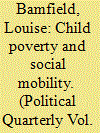

|
|
|
|
|
| Publication |
2012.
|
| Summary/Abstract |
Reviewing two of the latest reports by social mobility tsar, Alan Milburn and 'social justice' champion, Iain Duncan Smith, the article examines the politics and policy of the Coalition's fairness strategy and the jostling for position that is going on behind the scenes. Whilst continuing to pay lip service to the goal of ending child poverty, the government is seeking to redefine the problem, away from a narrow focus on relative low income. Beneath the rhetoric, the article highlights the close similarities between the 'new' and 'old' approaches, finding that the evidence behind the government's claims is unconvincing. Far from offering a 'step-change' in provision, it concludes that in the new age of austerity the Coalition will struggle to make any positive progress on tackling poverty and improving the relative life chances of disadvantaged children.
|
|
|
|
|
|
|
|
|
|
|
|
|
|
|
|
| 6 |
ID:
152551
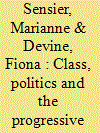

|
|
|
|
|
| Summary/Abstract |
This article considers contemporary class inequalities and how they might shape a progressive politics in the UK. Drawing on findings from the BBC Class Survey, it outlines changes in the class structure, class mobility and class identities. It is argued that the class structure is increasingly polarised and fragmented, with a wealthy elite, a vulnerable precariat and fragmented middle and working classes in between. Declining upward social mobility is a source of anxiety for middle-class and working-class parents alike. Class identification, especially working-class identification, has weakened over time, although class snobbery is far from dead. Class has changed and the class basis of politics is changing now too. A progressive politics is possible if the political parties of the centre-left appeal to the majority of the electorate rather than one class, acknowledge common concerns and worries and appeal to shared hopes and dreams that straddle class boundaries.
|
|
|
|
|
|
|
|
|
|
|
|
|
|
|
|
| 7 |
ID:
021965
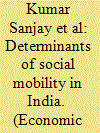

|
|
|
|
|
| Publication |
July 20,2002.
|
| Description |
2983-2987
|
|
|
|
|
|
|
|
|
|
|
|
|
|
|
|
| 8 |
ID:
147875
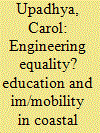

|
|
|
|
|
| Summary/Abstract |
This article traces the intersections between higher education, social mobility, and the reproduction of inequalities in Coastal Andhra Pradesh, India. It explores the social history, political economy, and culture of education in the region, and the formation of a dominant social imaginary that equates engineering degrees, IT jobs, and migration with social prestige and success. This aspirational culture has shaped mobility strategies across social classes, the educational regime, and government policies aimed at greater inclusion. But state interventions in engineering education have produced contradictory outcomes, creating paths of mobility for some social groups but new modes of marginalisation and immobility for others.
|
|
|
|
|
|
|
|
|
|
|
|
|
|
|
|
| 9 |
ID:
178646
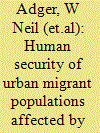

|
|
|
|
|
| Summary/Abstract |
It is widely suggested that migration is a key mechanism linking climate change to violent conflict, particularly through migration increasing the risks of conflict in urban destinations. Yet climate change also creates new forms of insecurity through distress migration, immobility and vulnerability that are prevalent in urban destination locations. Here we examine the extent and nature of human security in migration destinations and test whether insecurity is affected by length of residence and environmental hazards. The study develops an index measure of human security at the individual level to include environmental and climate-related hazards as well as sources of well-being, fear of crime and violence, and mental health outcomes. It examines the elements of human security that explain the prevalence of insecurity among recent and established migrants in low-income urban neighbourhoods. The study reports on data collected in Chattogram in Bangladesh through a survey of migrants (N = 447) and from qualitative data derived using photo elicitation techniques with cohorts of city planners and migrants. The results show that environmental hazards represent an increasing source of perceived insecurity to migrant populations over time, with longer-term migrants perceiving greater insecurity than more recent arrivals, suggesting lack of upward social mobility in low-income slums. Ill-health, fear of eviction, and harassment and violence are key elements of how insecurity is experienced, and these are exacerbated by environmental hazards such as flooding. The study expands the concept of security to encompass central elements of personal risk and well-being and outlines the implications for climate change.
|
|
|
|
|
|
|
|
|
|
|
|
|
|
|
|
| 10 |
ID:
161517
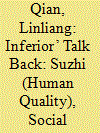

|
|
|
|
|
| Summary/Abstract |
Rural migrants in Chinese cities are often stigmatized as ‘low-suzhi’ population and marginalized in urban social hierarchy. Existing scholarship has demonstrated how urbanities used suzhi discourse to justify their exploitation of migrants while maintaining class distinctions, and how migrants embraced urban lifestyles to improve their suzhi. Yet, this literature rarely addresses resistance of the ‘inferior’. By looking at the social interactions between migrant entrepreneurs and local residents in a city of southeastern China, this study shows that the emerging e-commerce economy has enabled many rural migrants to acquire financial, social, and cultural capital, which empower them to speak for themselves. Their rising wealth and self-representation as ‘high-suzhi’ entrepreneurs has reshaped their identity in the urban business world.
|
|
|
|
|
|
|
|
|
|
|
|
|
|
|
|
| 11 |
ID:
147880
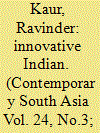

|
|
|
|
|
| Summary/Abstract |
The idea of jugaad, or frugal innovation, has gained wide popularity within policy circles and business schools as a breakthrough formula – from a quick-fix solution grown in adverse conditions to a six-point business principle – for economic growth generation. I argue that the new jugaad innovation narrative offers an uplifting, potentially emancipatory discourse of mobility in a setting where even after two decades of economic reforms, wealth gap and poverty stubbornly persist. Central to this shift are two processes. First, a dramatic re-signification of the aam aadmi (common man), within a new conceptual scaffolding of India in relation to modern science and technology, where the ability to innovate is portrayed as a natural gift, a deeply ingrained collective Indian trait that even the unlettered common man possesses. Second, the conditions of adversity and absence of public services for Indian citizens are turned on its head to position India as an ideal laboratory condition within which a culture of innovation takes birth. In short, jugaad enables a dramatic transformation of what was once considered unchanging, static and immobile mass into a source of innovation, inspiration and ultimately socioeconomic mobility.
|
|
|
|
|
|
|
|
|
|
|
|
|
|
|
|
| 12 |
ID:
173785
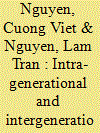

|
|
|
|
|
| Summary/Abstract |
This study examines intra-generational and intergenerational mobility of employment and income in Vietnam during the 2004–2014 period. It finds there was high mobility across occupations but less mobility across wage-job employment and economic sectors. Upward labour mobility increased over time because of the increase in skilled occupations. The intergenerational elasticity of earnings is estimated at around 0.36. Education plays an important role in increasing intra-generational as well as intergenerational mobility. The earning intergenerational elasticity for children with less than primary education is rather high, at 0.51, while this intergenerational elasticity for those with a college or university degree is much lower at 0.17.
|
|
|
|
|
|
|
|
|
|
|
|
|
|
|
|
| 13 |
ID:
178042
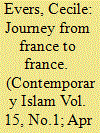

|
|
|
|
|
| Summary/Abstract |
Based on long-term ethnographic research with youth who were born to North, West, and East African families in northern Marseille, this article explores the common experience of alienation that practicing Muslims from Marseille report as they endeavor to live piously in their hometown, together with the mobility-oriented strategies they have devised to achieve belonging. Following these Muslim-Marseillais young adults longitudinally, it emerges that some relied on physical migration away from France (religiously conceived as hijrah) as a means of remaining pious and finding belonging. Others, meanwhile, navigated towards pious personhood and finding home in ways that still involved movement but transpired within France. Significantly, individuals who have chosen to remain in France carve out pious belonging by engaging in domestic movements to particular places in France, by pursuing occupational mobility, and by making advantageous use of prestigious linguistic registers like Standard French and Modern Standard Arabic. As such, the article suggests that hijrah is but one—and the most transnational—among various kinds of movement to which young Muslim-Marseillais turn as they grapple with discrimination, seek to improve themselves, and ascertain how best to belong.
|
|
|
|
|
|
|
|
|
|
|
|
|
|
|
|
| 14 |
ID:
116542
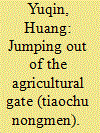

|
|
|
|
|
| Publication |
2012.
|
| Summary/Abstract |
Since the late 1950s, the implementation of the household registration (hukou) system has made converting rural hukou to urban status a central aspect of upward social mobility in rural China. Through a biographical approach, this article attempts to capture, in relation to historical periods between 1950 and 2012, the ups and downs of various forms of hukou conversion and social mobility channels, how these fluctuating routes have been perceived, interpreted, pursued, and actualised by the rural people in a central Chinese village, and their consequences in terms of gendered household educational resources distribution among children. By doing this, it addresses ongoing debates about the relationship between allocation of household resources, gender inequality, and social mobility in rural China. While examining the dynamics of these avenues to social mobility, this paper pays particular attention to education and its changing function as an important social mobility channel, and argues that there is an unintended link between higher educational attainment, improvements in gender equality in education in rural China, and social mobility. This link is nevertheless weak due to its logic of developmentalism.
|
|
|
|
|
|
|
|
|
|
|
|
|
|
|
|
| 15 |
ID:
092413
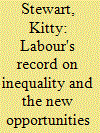

|
|
|
|
|
| Publication |
2009.
|
| Summary/Abstract |
In its first years in office, the Labour Government set out a wide-ranging and ambitious set of policies aimed at reducing poverty, inequality and social exclusion. A decade on, with the party facing probable catastrophic defeat in the next general election, how far can these ambitions be said to have been met? This article summarises the evidence. It also examines the most recent government White Paper on social mobility, New Opportunities: Fair Chances for the Future, published in January 2009, and asks whether this paper represents a serious last attempt to renew the equal opportunities agenda.
|
|
|
|
|
|
|
|
|
|
|
|
|
|
|
|
| 16 |
ID:
163334
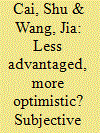

|
|
|
|
|
| Summary/Abstract |
Using a recent national dataset from the China Family Panel Studies, this study provides new evidence regarding the subjective well-being puzzle across multiple indicators among rural, migrant and urban populations in contemporary China. The results show that rural people on average have higher levels of life satisfaction than do migrants or urban residents, despite their disadvantaged economic situations. The decomposition analyses reveal that subjective social status plays a substantial role in accounting for group disparities in life satisfaction, whereas objective social status and experiences of social mobility have less explanatory power. These findings suggest the importance of within-group comparison in shaping individuals' well-being in segregated societies such as China.
|
|
|
|
|
|
|
|
|
|
|
|
|
|
|
|
| 17 |
ID:
187826
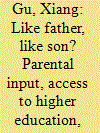

|
|
|
|
|
| Summary/Abstract |
This paper studies the role of parental input in university access in the context of a 10-fold expansion of China's higher-education sector since 1999. Using a Logit regression, we find that an increase in a parent's education level significantly raises their child's probability of entering university. Moreover, the effects of parental involvement and children's trust towards their parents on university entrance are highly significant. The results are robust to Probit and Linear-Probability-Model specifications. Heterogeneity analysis reveals that for rural and/or worse-educated families, parental involvement significantly affects the child's access to university, while for urban and/or better-educated families, the child's own study attitude is key for progression to university. To address the confounder of genetic inheritance, we use regression discontinuity and two-stage least squares and find that the nine-year compulsory education policy launched in 1986 not only increased the education years of the first generation by about 1.66 years, but has also had a lasting effect by raising the second generation's probability of access to university by 11.77%.
|
|
|
|
|
|
|
|
|
|
|
|
|
|
|
|
| 18 |
ID:
137921
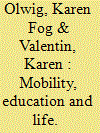

|
|
|
|
|
| Summary/Abstract |
Travel for educational purposes, once the privilege of the upper class, has become a global mass phenomenon in recent years. This special issue examines, within different cultural and historical contexts, the close relationship between migration, education and social mobility. Adopting the perspective that education includes a broad range of formative experiences, the articles explore different educational trajectories and the local, regional and transnational relations in which they are embedded. Three key issues emerge from the analyses: firstly, the central role of temporality in terms of both the overall historical conditions and the specific biographical circumstances shaping educational opportunities; secondly, the complex agendas informing individuals’ migration and the adjustment of these agendas in the light of the vagaries of migrant life; and thirdly, the importance of migrants’ self-perception as ‘educated persons’ and the invention of new, and the maintaining of old, identities that this involves.
|
|
|
|
|
|
|
|
|
|
|
|
|
|
|
|
| 19 |
ID:
126229
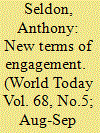

|
|
|
|
|
| Publication |
2012.
|
| Summary/Abstract |
The world loves British independent schools but they may lose their moral purpose if they chase the global super-rich,
|
|
|
|
|
|
|
|
|
|
|
|
|
|
|
|
| 20 |
ID:
164850
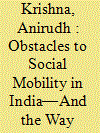

|
|
|
|
|
| Summary/Abstract |
For many ... significant upward mobility remains a doubtful prospect, while substantial downward mobility is a real possibility.” Eighth in a series on social mobility around the world.
|
|
|
|
|
|
|
|
|
|
|
|
|
|
|
|
|
|
|
|
|